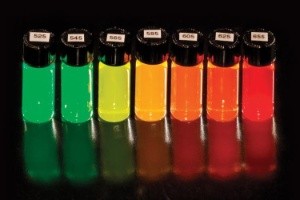Mar 23 2009
Life Technologies Corporation (NASDAQ: LIFE), and Nanosys, Inc. today announced a cross-licensing agreement to share rights to an intellectual property estate related to fluorescent nanocrystals (also known as quantum dots).
 Quantum dots glow when exposed to an ultraviolet light source. The color of the light depends upon the size of the quantum dot. (Photo: Business Wire)
Quantum dots glow when exposed to an ultraviolet light source. The color of the light depends upon the size of the quantum dot. (Photo: Business Wire)
New products developed as a result of this agreement will help prevent counterfeiting worldwide. The quantum dots will allow manufacturers to trace the source of their materials and manage and track product shipments, helping stop counterfeit material use in pharmaceutical and diagnostic products, food and beverages (and their agricultural and environmental sources), and electronic goods, reducing counterfeiting of currency, documents, fine art, and luxury goods.
Quantum dots are tiny (nanometer size) fluorescent particles. While invisible to the eye, they emit intensely bright light when exposed to low-cost violet or ultraviolet light sources. Quantum dots display unique colors due to differences in size. Due to their particulate nature, quantum dots can easily be blended with polymers, gels, or inks and printed onto most surfaces. The complexity of their manufacturing process also makes them almost impossible to counterfeit. And, because quantum dots are highly stable, extremely bright and absorptive, they offer advancements in solid state lighting, solar collector and electronic display technology.
"Life Technologies' quantum dots are currently being used in life science research and pathology, but there are vast opportunities to use them in a wide variety of applications," said Paul Grossman, Senior Vice President of Corporate Development & Strategy at Life Technologies. "Our new partnership with Nanosys will allow both companies to expand the opportunities for our combined technologies, and further the reach of Life Technologies into the applied markets."
Jason Hartlove, CEO of Nanosys, continued, "We are very excited to be partnering with Life Technologies to use our combined nanotechnology to address the growing and pervasive problem of counterfeit goods. By working together with Life Technologies, we can now offer comprehensive solutions and technology licensing to our customers to help them use our unique quantum dot materials for anti-counterfeiting."
The combination of the two companies' vast intellectual property estates includes over 270 patents and applications, including 84 issued U.S. patents, for use of fluorescent nanocrystals. The licenses will allow both Life Technologies and Nanosys to work with a variety of manufacturers who want to protect their products from counterfeiting. Nanosys is currently using quantum dot technology to produce devices such as LEDs, photovoltaics and electronic displays, while Life Technologies is focused on life science applications, including in vitro and in vivo cell imaging, flow cytometry, tumor margin detection, and protein detection.
The worldwide counterfeit goods trade, excluding counterfeit money, is believed to be on the order of $1 trillion annually. The U.N. estimates counterfeit drug sales alone were over $300 billion in 2008, while the World Customs Organization believes that other counterfeit goods sold for more than $600 billion. According to U.S. Immigration and Customs Enforcement, these losses cost American industry and trade between $200 billion and $250 billion each year and equate to 750,000 American jobs lost.